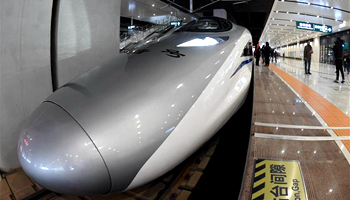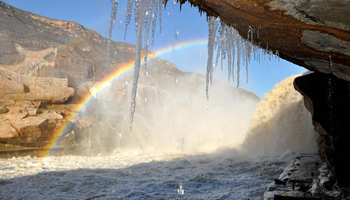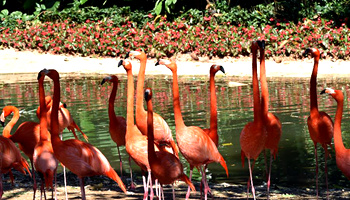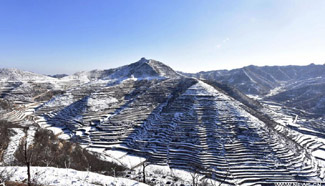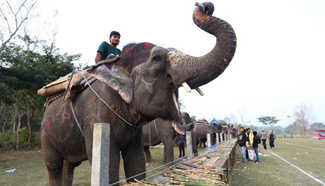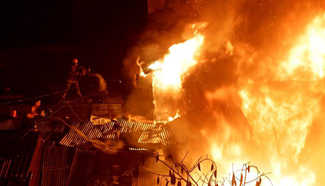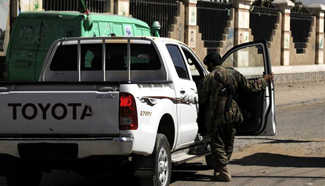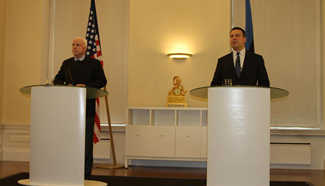WASHINGTON, Dec. 27 (Xinhua) -- Hawkish Japanese Prime Minister Shinzo Abe on Tuesday offered no apology during his visit to Pearl Harbor for a sneak attack in World War II that claimed more than 2,400 American lives.
Though the Japanese government billed Abe's visit as a tour of reconciliation, the no-apology tour also served no more than a political show from Abe that aims to strengthen Japanese-U.S. alliance amid uncertainty in the upcoming Donald Trump administration.
Calling himself "entire speechless" when standing at the Pearl Harbor memorial constructed on the sunken USS Arizona, Abe acknowledged that the United States and Japan fought a fierce war "that will go down in the annuls of human history."
However, except from offering his "sincere and everlasting condolences" to the souls of the Americans killed by troops of the Japanese Imperial Empire, no apology from Abe was issued.
As many as 2,403 Americans were killed, about 20 U.S. vessels were sunk or damaged and over 300 U.S. aircraft were damaged or destroyed when more than 350 Japanese warplanes launched stealth attacks.
"I think he should apologize. It was a raid that they bombed us and they should apologize. They already surrendered but they should apologize further," said Grace Sandoval, a teenager visiting Washington, D.C. from the U.S. State of Connecticut.
The attack came as a shock to the Americans and directly led to U.S. entry into World War II.
Japan surrendered on Aug. 15, 1945, after the United States dropped atomic bombs on the Japanese cities of Hiroshima and Nagasaki.
Abe's decision to visit Pearl Harbor came about six months after Obama visited Hiroshima.
Apart from reciprocating Obama's visit to Hiroshima, Abe's trip to Pearl Harbor was believed to be the latest step by the Japanese government to strengthen the Japan-U.S. alliance before Trump's inauguration next January.
During his presidential campaign, Trump repeatedly ripped U.S. defense of Japan as one-sided and expensive deal.
Japan's Kyodo News quoted a senior Japanese official as saying that since the election of Trump, Japan had been forced to think how best to show Trump that Japan was a trustworthy partner.
Related:
China on Abe's Pearl Harbor visit: sincere reflection "only key" to reconciliation
BEIJING, Dec. 27 (Xinhua) -- China on Tuesday responded to Japanese Prime Minister Shinzo Abe's Pearl Harbor visit by urging him to sincerely reflect on the country's history of aggression rather than offering diplomatic displays.
"It is only a one-sided wish that he wants to put an end to the history of World War II by just visiting Pearl Harbor," said Chinese Foreign Ministry spokesperson Hua Chunying at a daily press briefing. Full Story
News Analysis: Abe's duplicitous visit to Pearl Harbor more about forgetting than reconciling
TOKYO, Dec. 26 (Xinhua) -- Japanese Prime Minister Shinzo Abe's visit to Pearl Harbor which will culminate with a final summit with outgoing U.S. President Barack Obama on Tuesday will see the Japanese leader take part in a remembrance ceremony at the USS Arizona monument where thousands of U.S. sailors and marines were killed in a surprise attack by Japan on Dec. 7, 1941.
It was this sneak attack that was a catalyst for the United States to join World War II and emerge victors with the eventual nuclear bombings of Hiroshima and Nagasaki in Japan that forced Japan's unconditional surrender, a historical fact that to this day does not sit well with some rightist factions with significant political sway here and wholesale revisionist intentions. Full story
Commentary: Abe should show more sincerity, play less tricks during visit to Pearl Harbor
TOKYO, Dec. 26 (Xinhua) -- Japanese Prime Minister Shinzo Abe starts a two-day visit to Pearl Harbor on Monday, where he is slated to attend a ceremony with U.S. President Barack Obama to remember the thousands of U.S. soldiers and civilians killed during a surprise attack by Japan there on Dec. 7, 1941.
Abe expected that the trip will be a symbol of reconciliation, but his no-apology stance fully demonstrates that the visit is only a diplomatic show aiming to score political points and strengthen Japan's alliance with the United States, while constituting no sincere reflection upon Japan's wartime crimes. Full story




